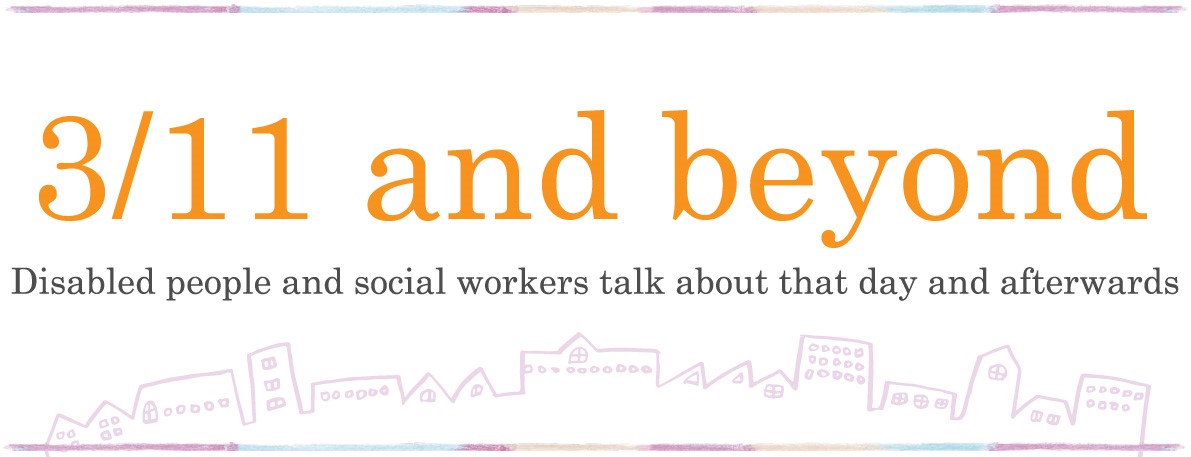 Story: Mr. Kenichi Tatsumi (man/ in his 60s at the time/ visually impaired)
Story: Mr. Kenichi Tatsumi (man/ in his 60s at the time/ visually impaired)The importance of connections
 Story: Mr. Kenichi Tatsumi (man/ in his 60s at the time/ visually impaired)
Story: Mr. Kenichi Tatsumi (man/ in his 60s at the time/ visually impaired)You said you contacted the Miyagi Prefecture and Yokohama City Visually Impaired Welfare Associations while you were in Yokohama. Was that because you wanted something to do?
I suppose so. I didn’t know what was going to become of me, and I think it was really good for me to build relationships with local people. I still maintain a lot of those relationships now.
So you’re still connected and stay in touch even from afar.
Yes. I started attending the Yokohama Visually Impaired Welfare Association ping-pong club after the director of the vocational support center introduced it to me, for instance. I felt bad for receiving help all the time and not giving back, but I really was fulfilled.
So even in that situation, you always had the desire to contribute somehow.
It’s nothing so noble as that, but I did feel like I wanted to do something. I’m still exploring it at the moment, but I’m thinking I’d like to do something to help visually impaired people in the Ishinomaki area find jobs. Some of my friends feel the same way too. Helping visually impaired people find work is quite difficult, but you won’t get anywhere if you give up just because it’s hard. For example, there’s a vocational support center for the visually impaired in Sendai that makes braille business cards and envelopes, and my other visually impaired friends and I are trying to find a way to do that ourselves. We just want to do something tangible. Once you have something tangible, then it’s easy to show the local government and such, and you can see the next step. We plan to keep moving forward with the cooperation of the local government and the Council. I also feel like the information network for visually impaired people isn’t very reliable. Information just doesn’t tend to make its way to us. Not all visually impaired people are part of a Visually Impaired Welfare Association. They might stay away from the Associations because they don’t like that kind of formality. I want those people to be able to get information, too.
You seem to be very active. Was any of this inspired by the disaster?
I suppose so. When I was in Kitakamicho, the public transportation wasn’t very convenient, so I stayed cooped up at home a lot. But then my parents died the year before the disaster, and I was all alone. I was thinking about what to do when the earthquake happened and I had to leave my hometown.
When you returned to Sendai from Yokohama and moved into an apartment, were you alone?
I was alone, with just one room. The apartment was privately owned, but the government treated it as temporary housing for disaster victims and paid the rent.
Did you receive any assistance there?
I had a home helper come help me with everyday things. Volunteers from Eye Support Sendai and the Japan Guide Dog Association Sendai Training Center also came. I also had a helper to assist me when I went out. I’ve learned to walk on my own so I can do it, but I’ve also heard of accidents happening, so I have someone help me whenever I go out.
Were your neighbors aware of your visual impairment?
I used my cane when I walked, so I’m pretty sure they knew.
Did any of your neighbors ever help you when you were walking, for instance?
I had a professional helper, so the neighbors didn’t help me, but once when I was practicing walking outside, someone said, “Feel free to let me know if you need help.” That was really nice.
I’ve heard from other visually impaired people I’ve interviewed that adapting to a new environment is really difficult for them, and that when they move into a new place it’s really frustrating until they become familiar with the space. Listening to what you said just now, I thought it must be really difficult for you to cross an intersection on your own and figure out how wide it is, or figure out how high steps are.
I think it’s more difficult indoors. Foot bridges and things like that have handrails and steps at consistent heights, so it’s fine. It’s in the inconsistent places, like really wide spaces, where I completely lose my sense of direction. When I was living in Sendai, I had just one room with a kitchen, a bath, and a toilet. So I could always stretch my hand out and touch something. I think that’s best for living alone. But it’s been more difficult recently living here (in a new house in Ishinomaki City). I moved here on August 7th last year, and a moving company moved all my things here so I had no idea where anything was. I couldn’t find the dish soap or anything. There was something that seemed like a drink sitting next to the stove for a while, but then I thought, “Wait, this can’t be a drink.” It turned out to be toilet cleaner! I ended up stumbling around running into things until I managed to rearrange them.



